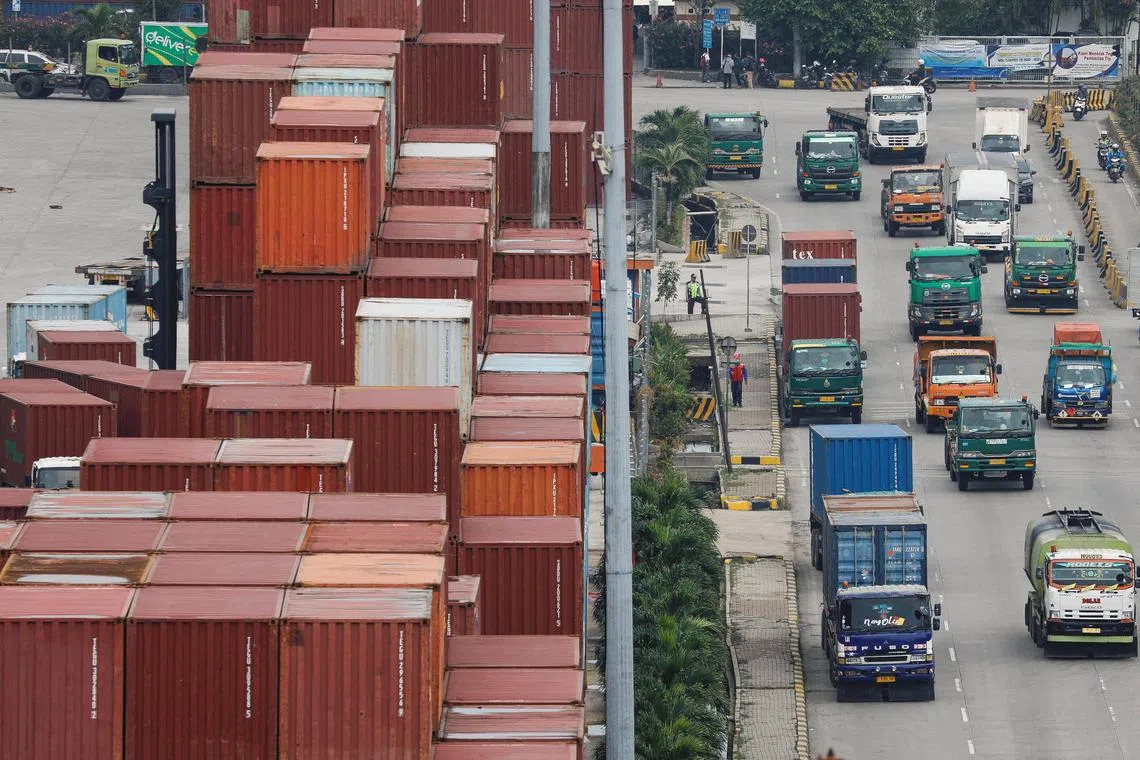Indonesia to face 19% tariff under trade deal
Sign up now: Get ST's newsletters delivered to your inbox

It remains unclear when the lower tariff level announced on July 15 will take effect for Indonesia.
PHOTO: REUTERS
Follow topic:
JAKARTA - Indonesia said on July 16 it had reached a trade deal with the United States after an “extraordinary struggle” in negotiations which resulted in a reduction of proposed US tariff rates on the South-east Asian country’s exports to 19 per cent from 32 per cent.
US President Donald Trump said on July 15 that a deal had been struck
“This is an extraordinary struggle by our negotiating team led by the Coordinating Minister for Economic Affairs,” Mr Hasan Nasbi, the Indonesian president’s spokesperson, told reporters on July 16.
Indonesian leader Prabowo Subianto on July 16 hailed a “new era of mutual benefit” with Washington after President Donald Trump announced Indonesian goods entering the United States would face a 19 per cent tariff, far below the 32 per cent he had earlier threatened.
“I had a very good call with President Donald Trump. Together, we agreed and concluded to take trade relations between Indonesia and the United States into a new era of mutual benefit,” he wrote in an Instagram post, without providing details of the deal.
Mr Prabowo, a populist former general, posted pictures of himself laughing on the phone with Mr Trump.
Mr Prabowo later said that his government understood the interests of the United States in trade talks, and that the two countries will continue to negotiate even after reaching the deal: “We’ve given our offer, we cannot give more.”
Indonesia – the world’s fourth-largest country by population and a member of G20 – ran a goods trade surplus of US$17.9 billion (S$22.9 billion) with the United States in 2024, according to the US trade representative.
Mr Nasbi called the deal a “meeting point” between the two governments, and said Indonesia’s tariff rate was much lower than other countries in South-east Asia.
Indonesia, South-east Asia’s largest economy, has committed to purchasing 50 Boeing jets, US$15 billion in US energy, and US$4.5 billion in US agricultural products as part of its trade agreement with the United States, Mr Trump said.
Mr Trump outlined an Indonesia deal similar to a preliminary pact struck recently with Vietnam, with no levies on US exports to Indonesia. It also included a penalty rate for so-called transshipments of goods from China via Indonesia.
The Jakarta stock index rose as much as 0.8 per cent on July 16 after the deal, which Indonesia’s central bank said would provide a positive catalyst for economic activities. The JKSE is up 10 per cent since early April.
Bank Indonesia, which cut rates on July 16, said the deal will have a positive impact on the archipelago’s exports and economic growth, and provide certainty to financial markets.
“Well, 19 per cent is better than 32 per cent,” Mr Matt Simpson, a senior market analyst at City Index in Brisbane, said.
“Indonesian non-oil exports such as footwear and textiles will take a hit, but energy and agriculture are set to gain. Officials are of course pleased because they’re in Mr Trump’s good books,” he added.
Natixis warned the Indonesian economy would still be affected by Mr Trump’s tariffs on China – Indonesia’s biggest trade partner.
Mr Myrdal Gunarto, an economist with Maybank Indonesia, described the deal as relatively good, as Jakarta is getting a tariff below those imposed on other South-east Asian neighbours.
“(The deal) opens more space for domestic lower monetary policy rate,” he said, predicting it would also trigger capital inflows.
A bare majority of analysts in a Reuters poll expected Indonesia’s central bank to cut interest rates later on July 16 to bolster economic growth. REUTERS, AFP

